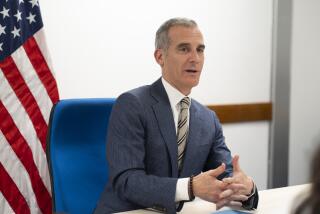Barry Diller talks up Aereo on first day of Milken conference
The three-day Milken Institute Global Conference kicked off Monday in Beverly Hills, with media moguls Barry Diller and Rupert Murdoch among the hundreds of business leaders and politicians slated to speak.
The annual event, run by financier and philanthropist Michael Milken, will also host talks by Microsoft Corp. co-founder Bill Gates, former British Prime Minister Tony Blair, former Vice President Al Gore, Magic Johnson and Los Angeles Mayor Antonio Villaraigosa. There are close to 4,000 attendees this year watching 600 panelists participating in some 140 sessions.
The conference, which was launched in 1998, focuses on topics that include technology, philanthropy, government policy, economics, investing and the media. Money raised during the conference helps fund the Milken Instituteâs nonprofit operations.
Among the talks given during the first day of the conference, Diller spoke about the growing influence of start-up companies that deliver entertainment via the Internet. He pointed out that one such company, Aereo Inc., could eventually end up with 20 million to 30 million subscribers and rival broadcasters such as CBS, NBC, ABC and Fox.
Diller, chairman of IAC, is a backer of Aereo, which charges consumers $8 to $12 a month to receive broadcast channels through the Internet via a tiny antenna. Broadcasters are trying to shut down Aereo because, unlike cable and satellite operators, it does not pay them to transmit their programming. So far, Aereo has survived legal challenges from the big broadcasters accusing it of copyright theft.
âNo incumbent ever wants to see its territory invaded,â Diller said of the lawsuits against Aereo.
Diller, who was an architect of the Fox network and prior to that headed Paramount Pictures, said it was his hope that Aereo and other new Internet-based distribution systems would ultimately change the way programming is sold to consumers.
He predicted that at some point, HBO will sell its service on a stand-alone basis through its HBO Go application to consumers who currently have to sign up for dozens of channels just to have the option to get the channel.
âDo not put your hand in front of a train,â Diller said of those who are resisting change.
BlackBerry Chief Executive Thorsten Heins said during another panel that he believes a continued emphasis on a secure platform built for business professionals will help the Canadian tech company regain its foothold in the smartphone market.
Heins said wireless carriers are looking for a third platform to break the smartphone duopoly held by Apple Inc. and Samsung Electronics Co. He said the BlackBerry 10 platform has the potential to fit that role, especially when partnered with the companyâs two new smartphones.
The company this year is releasing two new devices that have been fitted with top-of-the-line technology to compete with Appleâs iPhone 5 and the Samsung Galaxy S 4.
But despite aiming BlackBerryâs tech toward business professionals, Heins made it clear that his company is gunning for the top. When asked how he would measure success for BlackBerry five years from now, Heins said he wants his company to be the âabsolute leaderâ in the smartphone market.
âI want to get as much market share as I can,â he said.
Another panel later in the day focused on 3-D printing, the technology that enables people to print three-dimensional products by precisely depositing layer upon layer of material. The panel included top executives in the industry.
Innovators are working on creating entire buildings and human parts such as bones using the high-tech printers, said Avi Reichental, CEO of printing firm 3D Systems Corp. âAll of this activity is happening as we speak,â he said at the panel. âItâs not futuristic sci-fi.â
The technology is on its way to revolutionizing manufacturing in the same way that online music sharing disrupted the music industry and blogging changed journalism, said panelist Peter Weijmarshausen, chief executive of Shapeways Inc. Eventually, he said, average consumers will have 3-D printers in their homes capable of printing objects such as jewelry, appliance parts and toys. He called this âdemocratizing the creative tool.â
Times staff writer Salvador Rodriguez contributed to this report.
More to Read
Inside the business of entertainment
The Wide Shot brings you news, analysis and insights on everything from streaming wars to production â and what it all means for the future.
You may occasionally receive promotional content from the Los Angeles Times.












